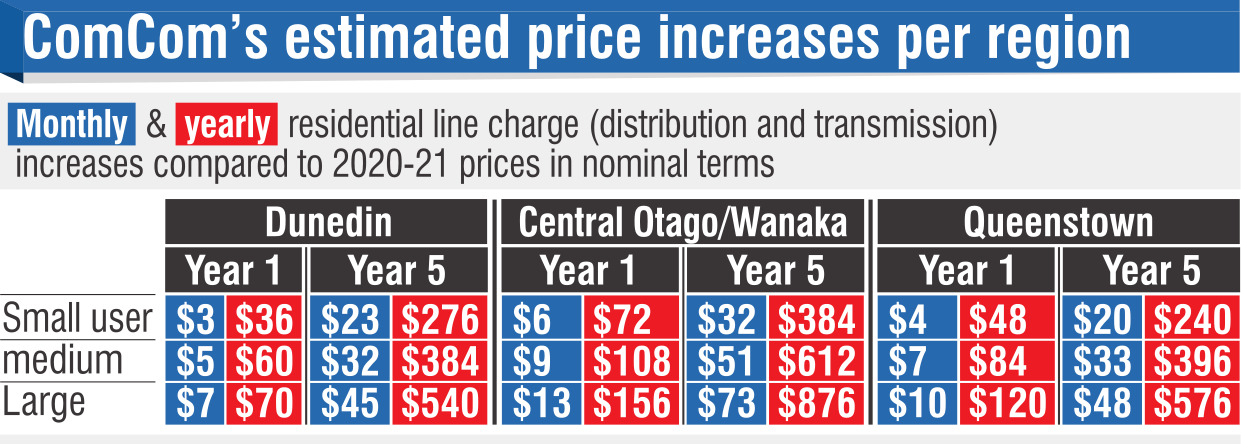
Central Otago residents are still set to bear the brunt of the proposed price increases, but Central Otago Mayor Tim Cadogan says he hopes Dunedin residents can still be forced to pay a fairer share.
In its draft decision on the Aurora pricing released yesterday, the Commerce Commission said it was clear Aurora had lost the trust and confidence of its customers after the regulator consulted people in Dunedin, Queenstown, Central Otago and Wanaka.
The commission estimated customers in Central Otago and Wanaka were facing the biggest increase, households defined as medium users set to pay $612 more a year in 2026.
For large users that figure rises to an increase of $876.
In Dunedin, the average increase over five years was likely to be $384, whereas in Queenstown it was $396 for medium users.
Mr Cadogan said the draft decision on how much Aurora could increase power bills still had Central Otago customers paying more than those in Queenstown and Dunedin, which he pointed out was where Aurora was owned.
The pricing mechanism was "arbitrary" and he hoped the Electricity Authority (EA) would change it.
EA director of transmission pricing methodology Rob Bernau said the organisation was aware of concerns about Aurora’s regional pricing.
The authority was taking a closer look to determine whether Aurora’s approach appropriately reflected the costs of its network, he said.
The commission called on Aurora to be more transparent with how it worked out prices for the three different areas it supplied.
In its price proposal sent to the commission in June, Aurora said prices could increase the most in Central Otago and Wanaka, up by about $30.90 a month by 2024. However, that did not include GST or inflation.
The commission adjusted Aurora’s proposal figures to give a more realistic picture of what consumers were facing, which was likely to be an increase of up to $47.30 a month by 2024.
"From our position ... we think that it’s better for consumers to understand the actual amounts they’ll see on their bills or the actual increases they’ll experience," associate commissioner John Crawford said.
The draft decision’s equivalent figure after slashing what Aurora needed to spend was a $31.50 increase.
The commission also preferred to increase the proposal to a five-year period rather than the three years Aurora had suggested.
What Aurora had proposed to spend on its network was able to be cut by about $86million by the commission with reductions in capital spending on new assets ($41 million) and operational expenditure ($45 million).
Mr Crawford said it was clear Aurora had to be more accountable and transparent to its customers.
"One of the major themes from our discussions with Aurora’s customers was their lack of trust and confidence in Aurora’s ability to deliver what it says it will."
The commission proposed Aurora should have to publish an "annual delivery report", in which it detailed exactly what work it had done in each region and then present that in public meetings.
Aurora said it would work through the detail of the draft decision before giving further comment.
The commission will visit Otago again between November 23 and December 1 as it takes submissions on its draft decision.
A final decision is due by March 31 and new prices are expected to start on April 1.
Comments
I ask again, why are heads not rolling and why is this outfit being allowed to gouge it's users again?.
How are we to know the extra money being sort will be spent on actually rebuilding the network and not paying people millions a year?.












